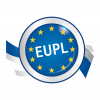EUPL (European Union Public Licence) is the first European Free/Open Source Software licence. It has been created on the initiative of the European Commission. It is also the first Free/Open Source Licence with the same official value in many European languages. The main objective of the European Commission is to distribute widely and promote the use of software owned by itself and other European Institutions under an Free/Open Source Licence conform to European law requirements. The EUPL is however written in neutral terms so that a broader use might be envisaged. In addition, distribution of software should avoid the exclusive appropriation of the software even after improvement by a third party (therefore, the EUPL is a "copyleft" licence). Although the potential users of European Institutions' software are mostly other public sector administrations, there is no clause in the EUPL restricting its broader use. Potentially, the EUPL could be used by any other software owners: it could become – in various languages - an adequate legal interoperability instrument across Europe. Nevertheless, the EUPL purpose is not to compete with other licences. It might be used primarily by public administrations, either European or national, that would need a common licensing instrument to mutualise or share software and knowledge. EUPL is compatible with the GPL and other F/OSS licences. EUPL contains a compatibility clause and provides for a list of compatible copyleft licences. EUPL has been elaborated under the IDABC programme.
Policy Context
The first EUPL draft (v.0.1) went public in June 2005. A public debate has then been organised by the European Commission (IDABC). The consultation of the developers and users community was very productive and has lead to many improvements of the draft licence (10 out of 15 articles were modified). Based on the results of these modifications (a detailed report and the draft EUPL v.0.2) the European Commission has elaborated a final version (v.1.0) that was officially approved on 9 January 2007, in three linguistic versions. By a second Decision of 9 January 2008, the European Commission validated the EUPL in all the official languages of the European Union.
Description of target users and groups
Although the potential users of European Institutions' software are mostly other public sector administrations, there is no clause in the EUPL restricting its broader use. Potentially, the EUPL could be used by any other software owners: it could become - in various languages - an adequate legal interoperability instrument across Europe. Nevertheless, the EUPL purpose is not to compete with other licences. It might be used primarily by public administrations, either European or national, that would need a common licensing instrument to mutualise or share software and knowledge.
Description of the way to implement the initiative
The IDABC programme has constantly supported the objective of distributing widely its own software, such as CIRCA or IPM. Distribution of software under the EUPL provides better guarantees to develop a stronger developers and users community and to ensure improvement and takeover after the expiration of the IDABC programme. To this extent, the European Commission has investigated various alternatives, submitted the EUPL to public consultation and made appropriate modifications. The EUPL is one of the instruments to bring the European Public sector to develop collaborative initiatives.
Return on investment
Return on investment: Not applicable / Not availableTrack record of sharing
The purpose of the European Commission is first of all to distribute its own software under the licence. Some applications developed in the framework of the IDABC programme, such as CIRCA, or IPM have already been licensed under the EUPL in 2007. Other European Institutions are also interested in using the licence.
Lessons learnt
- Legal check can take longer than you imagine - Take into account multilingualism - Take into account the applicable law and the compatibility of related initiatives (licenses in our case)
Scope: International
